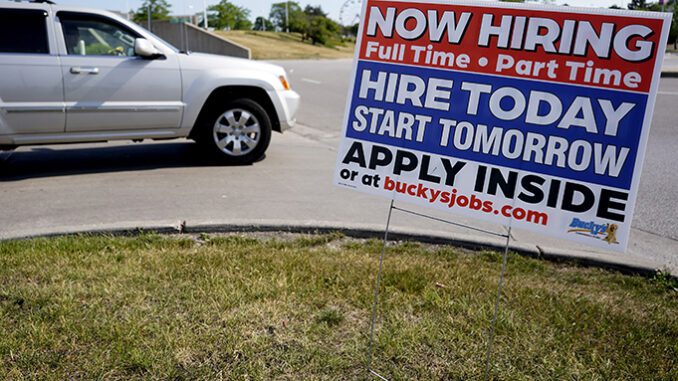
RALEIGH – The continuing trouble employers are having to fill the jobs gap in the state economy has business leaders and state legislators searching for the right mix of incentives and talent.
Advertisements for jobs across North Carolina show how desperate businesses are to attract talent.
CaptiveAire Systems, the nation’s leading manufacturer of commercial kitchen ventilation systems, based in Raleigh and founded by Robert Luddy, is offering a $2,000 sign-on bonus along with 401(k) match, paid holidays, paid vacations, monthly bonuses, perfect attendance award programs, gym memberships, and discounted mobile wireless plans to attract workers to its manufacturing facility in Youngsville.
In comments to NSJ, Luddy views the current economic situation through a simple lens of government vs. capital: “The job market is improving incrementally. Paying unemployment for long durations when the economy is robust is immoral and undermines the dignity of individuals. Massive government spending, while it restricts labor supply, has led to shortages in every industry with sustainable inflation,” said Luddy on Tuesday.
And while many employers jockey for position to hire good workers in this challenging environment, some have decided to call it quits for good. One of the latest casualties of this post-pandemic economy is the legendary Price’s Chicken Coop in Charlotte.
Price’s announced with little warning last Thursday it was closing after nearly 60 years, with the last date of service Saturday, June 19. In a statement posted to the restaurant’s Facebook page, Price’s cited the labor shortage, rising food costs, food quality and another coin shortage.
Lines quickly formed at the venerable establishment with wait times of over 4 and 5 hours to get one last bite.
While Price’s decision was also partly driven by ever-growing redevelopment in Charlotte, restaurants large and small are reporting similar issues.
Earlier in May, large regional chain Bojangles restaurants were posting signs that they were out of items such as Chicken Supremes and other chicken products due to supply shortages.
And as summer break kicks off, area beach towns starved for tourists during the lockdowns of 2020 are now experiencing a swell in demand as vacationers return. Up and down the coast, restaurants and bars have been especially stretched thin, forced to reduce open times as the need for waiters, cooks, and other staff threaten to overwhelm existing staff.
The ripple effect is visible across nearly all sectors of the service industry. Travelers at RDU International Airport Monday were caught off guard for the third day in a row as American Airlines, the nation’s largest airline, announced over 100 flight cancellations across the country, due to staff and maintenance shortages.
These widespread shortages come on the heels of data released last week indicating the number of Americans applying for unemployment benefits had risen for the first time since April despite evidence that the economy and the job market are rebounding steadily from the pandemic recession.
The Labor Department said Thursday that jobless claims rose 37,000 from the week before to 412,000. As the job market has strengthened, the number of weekly applications for unemployment aid has fallen for most of the year.
With vaccinations up and more consumers venturing out to spend — on restaurant meals, airline fares, movie tickets and store purchases — the economy seems to be rapidly recovering from the recession. All that renewed spending has fueled customer demand and led many companies to seek new workers, often at higher wages, and avoid layoffs.
Some economists argue that the speed of the rebound from the recession has caught many businesses off guard and touched off a scramble to hire. In May, employers added a less-than-expected 559,000 jobs, evidence that many companies are struggling to find enough workers as the economy recovers faster than expected.
Though jobless claims have tumbled since the start of 2021, when they exceeded 900,000, they remain high by historical standards. Before the pandemic paralyzed the economy in March 2020, unemployment applications were running at about 220,000 a week.
Many Americans are contending with health and child care issues related to COVID-19 and with career uncertainty after the recession wiped out many jobs for good. Some who have lost work during the pandemic have decided to retire. Others are taking their time looking for work because, in some cases, supplemental federal jobless benefits, on top of regular state unemployment aid, pay them more than their old jobs did.
Many states, though, are set to begin dropping the supplemental federal jobless aid this month.
In North Carolina, House lawmakers passed a bill earlier this month that would remove the state from the Federal Pandemic Unemployment Compensation program.
North Carolina Senate Bill 116 now sits in a Senate conference committee’s hands. If an agreement is hammered out, North Carolina would join 25 other states that have also canceled their benefits early. Withdrawing from the program early would mean the loss of around $500 million in federal aid by the program’s scheduled end September 6th.
According to the NC Department of Commerce, about a quarter million unemployed workers in North Carolina are currently receiving the benefit, worth $300 per week, adding up to between $72 and $75 million federal dollars pumped into the state’s economy each week.
The NC Chamber has lobbied for both Senate Bill 116 and Senate Bill 334, which contains a $1 billion grant to assist job creators.
“North Carolina job creators across multiple industries have reported their acute struggles to find willing, qualified talent during this unique rebalancing period for our economy. The NC Chamber team has been working hard along with others in the business community to engage with state leaders and urge them to take decisive action to solve this talent gap. We have been adamant in these discussions that businesses need solutions now, not months from now,” a May 27 statement from the North Carolina Chamber read.
Republican House Speaker Tim Moore argued the additional federal subsidies are keeping workers at home. He says a shortage of workers is slowing the state’s economic recovery and putting businesses in jeopardy at the very time they’re trying to get back on their feet.
“We should not have a system in place that has been thrust upon us by this federal program where folks are incentivized not to work,” Moore said. “It doesn’t make sense. It’s not how we can operate this economy.”
The Associated Press contributed to this report.




